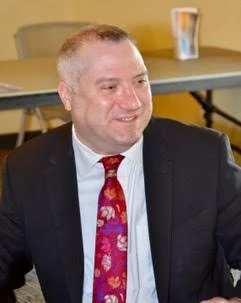Preaching from a Place of Privilege
04-03-2023
Culturally attentive pastoral leadership can help individuals recognize the impact history and society has had in shaping their own lives as well as the lives of the congregations and communities they are called to serve. Among this May’s nearly 60 candidates for graduation is Rev. Jonas Hayes, a D.Min. candidate who is using conversations about race, diversity, and privilege to bring members of a Long Beach, California church closer together.
Rev. Jonas Hayes was meeting with a group of community organizers when a topic for an upcoming program occurred to him. The lone white man at the table, Rev. Hayes suggested, “why don’t we do something on systemic racism and white fragility.” He quickly following up, “who could be a speaker for that?” A friend, also a pastor, turned to him and replied, “Well, you could be that speaker.”
“In that moment, I froze,” remembers Rev. Hayes, senior pastor of Grace First Presbyterian Church in Long Beach, Calif. “I had grown up in a very open-minded family…I had seen people wounded and hurt by racism…but I didn't think of myself as being that speaker. I knew, though, that I didn’t want to freeze up because of such important conversations… that the pain of staying frozen was greater than the pain of walking into the issue…and if this conversation didn’t come from the pulpit on Sunday mornings, where was it going to come from?”
At this year’s commencement on May 13, Rev. Hayes, will earn his Doctor of Ministry degree from McCormick. The focus of his doctoral thesis – “Creating Space for Every Voice: Preaching Diversity from a Place of White Privilege.”
“In our politics and culture, we hear a lot about racism,” says Rev. Hayes, “I wanted to engage the topic from a theological perspective. The world is a vastly diverse place and that says something to me about God. Diversity is a lens into the character and heart of God. I want to enter important discussions that impact people with God’s lens.”
Culturally attentive pastoral leadership, notes Rev. Dr. Ozzie Smith, Jr., M.Div.’93, interim director of McCormick’s Doctor of Ministry Programs, can help individuals recognize the impact history and society has had in shaping their own lives as well as the lives of the congregations and communities they are called to serve. The diversity that is part of the church is expressed in many ways – ethnicity, socioeconomic backgrounds, and religious practices are just a few.
“Our understanding of each other and our knowledge of our histories are two powerful means the Holy Spirit can use to break down all kinds of barriers,” said Rev. Dr. Smith, “The search for the common ground that Dr. Howard Thurman dreamed of, and Dr. King died for, is a vision I see theological education helping to make a reality. My interactions with McCormick students have shown me that they know what our world is, and they are prepared to work toward making it what it could be.”
Storytelling and community building
What has been helpful for valuing the diverse make up of Grace First Presbyterian Church
is listening to each other’s stories, Rev. Hayes points out. “There’s no church where everyone is like-minded…but our relationships can be deepened by more faithfully hearing each other's stories,” he says. “Part of my work during the past few years has been to proclaim more of these stories that are right under our roof and acknowledge them in my sermons.”
Grace First Presbyterian Church was formed 20 years ago when two Presbyterian congregations, one mostly Japanese American and one mostly white, came together. Today, its membership includes individuals from more than 10 ethnic backgrounds.
“We’re seeing active participation coming from everywhere in the church,” says Rev. Hayes. “At a recent new members’ class, nearly all those attending said that the church’s mission and its messaging on diversity and inclusion were key reasons for coming here.”
The conversations are not only initiated by the church’s pastor. Church members are encouraged to share their spiritual journeys, celebrate cultural traditions, and wear clothing representative of their cultural heritage. Giving voice and images to the church’s diversity has facilitated conversations among congregants.
“The Christian church has long held a practice of witnessing…a telling of our stories that helps to strengthen our faith,” says Rev. Hayes. “Anyone can enter the conversation if they are seeking to interact faithfully and wanting to understand and love people…preaching about race, diversity, white fragility, and similar topics can trigger deep emotions. We have to preach with a pastor’s heart. Our love for people has to be crystal clear.”
Rev. Dr. Ozzie Smith, Jr.
Rev. Jonas Hayes



